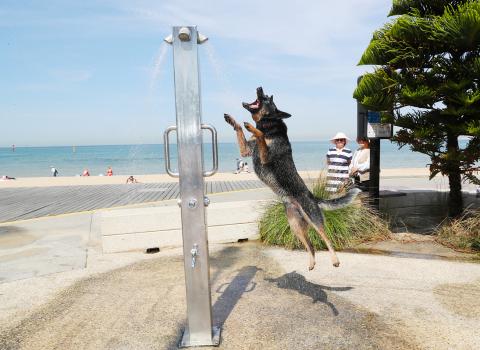Australia this week experienced its hottest day on record and the heat wave is expected to worsen, exacerbating an already unprecedented bushfire season, authorities said yesterday.
The average nationwide temperature of 40.9°C on Tuesday beat the previous record of 40.3°C in January 2013, the Australian Bureau of Meteorology said.
“This heat will only intensify further today [Wednesday],” meteorologist Diana Eadie said.

Photo: EPA-EFE
The heat wave is another alarm bell about global warming in Australia, where this year’s early and intense start to regular summer bushfires has heaped pressure on the Australian government to do more to tackle climate change.
Hundreds of bushfires have been raging across Australia for months, including a “mega-blaze” burning north of Sydney.
Smoke from the fires has engulfed Sydney, raising air pollution to hazardous levels in an event that leading doctors have labeled a “public health emergency.”
At least 3 million hectares of land has been torched across Australia, with six people killed and about 700 homes destroyed.
Scientists have said that the blazes have come earlier and with more intensity than usual due to global warming, and a prolonged drought that has left the land dry and many towns running out of water.
The fires have sparked climate protests targeting the conservative government, which has resisted pressure to address the root causes of global warming to protect the country’s lucrative coal export industry.
Record spot temperatures were recorded this week in western Australia, where firefighters have also been battling blazes raging across thousands of hectares of land.
The hot weather is drifting across the country’s arid center toward the east.
Temperatures in parts of New South Wales are forecast to reach about 45°C today, while those in western Sydney are due to reach more than 46°C as conditions worsen on Saturday.
Turbulent winds of up to 100kph are forecast to also hit the eastern coast and worsen the blazes.
“Over the next few days, we are going to see firefighters, the emergency services and all those communities close to fires ... challenged with a new threat,” New South Wales Rural Fire Service Commissioner Shane Fitzsimmons said yesterday.
Embers carried by the winds can travel up to 30km from a blaze, authorities said.
“We are going to have a number of fronts that are going to fuel or escalate the fires burning, but also the potential to have spot fires and embers traveling very long distances,” New South Wales Premier Gladys Berejiklian said.
Australian Prime Minister Scott Morrison last week made a rare admission that climate change was one of the “factors” behind the fires, but he defended the government’s record on emissions reduction and failed to announce additional measures to address the issue.
Climate protesters plan to march on Morrison’s official residence in Sydney this week to rally for change and highlight his absence as large parts of the country burn. Morrison is vacationing at an undisclosed location overseas.

The Burmese junta has said that detained former leader Aung San Suu Kyi is “in good health,” a day after her son said he has received little information about the 80-year-old’s condition and fears she could die without him knowing. In an interview in Tokyo earlier this week, Kim Aris said he had not heard from his mother in years and believes she is being held incommunicado in the capital, Naypyidaw. Aung San Suu Kyi, a Nobel Peace Prize laureate, was detained after a 2021 military coup that ousted her elected civilian government and sparked a civil war. She is serving a

China yesterday held a low-key memorial ceremony for the 1937 Nanjing Massacre, with Chinese President Xi Jinping (習近平) not attending, despite a diplomatic crisis between Beijing and Tokyo over Taiwan. Beijing has raged at Tokyo since Japanese Prime Minister Sanae Takaichi last month said that a hypothetical Chinese attack on Taiwan could trigger a military response from Japan. China and Japan have long sparred over their painful history. China consistently reminds its people of the 1937 Nanjing Massacre, in which it says Japanese troops killed 300,000 people in what was then its capital. A post-World War II Allied tribunal put the death toll

‘NO AMNESTY’: Tens of thousands of people joined the rally against a bill that would slash the former president’s prison term; President Lula has said he would veto the bill Tens of thousands of Brazilians on Sunday demonstrated against a bill that advanced in Congress this week that would reduce the time former president Jair Bolsonaro spends behind bars following his sentence of more than 27 years for attempting a coup. Protests took place in the capital, Brasilia, and in other major cities across the nation, including Sao Paulo, Florianopolis, Salvador and Recife. On Copacabana’s boardwalk in Rio de Janeiro, crowds composed of left-wing voters chanted “No amnesty” and “Out with Hugo Motta,” a reference to the speaker of the lower house, which approved the bill on Wednesday last week. It is

FALLEN: The nine soldiers who were killed while carrying out combat and engineering tasks in Russia were given the title of Hero of the Democratic People’s Republic of Korea North Korean leader Kim Jong-un attended a welcoming ceremony for an army engineering unit that had returned home after carrying out duties in Russia, North Korean state media KCNA reported on Saturday. In a speech carried by KCNA, Kim praised officers and soldiers of the 528th Regiment of Engineers of the Korean People’s Army (KPA) for “heroic” conduct and “mass heroism” in fulfilling orders issued by the ruling Workers’ Party of Korea during a 120-day overseas deployment. Video footage released by North Korea showed uniformed soldiers disembarking from an aircraft, Kim hugging a soldier seated in a wheelchair, and soldiers and officials